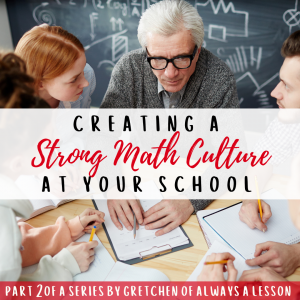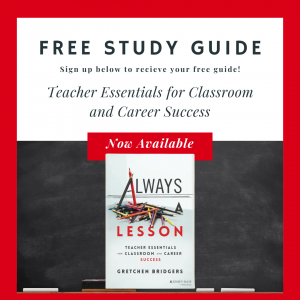Creating a Strong Math Culture at your School [Part Two]
Is your school making progress in valuing math? How can you tell?
 Creating a strong math culture is a question we have been discussing recently here on the blog based on a discussion I lead on the Clubhouse app. Over 20 educators (classroom teachers, administrators, school board members, instructional coaches, and content area specialists) came together to share ideas and ask questions about how to increase the math culture in their buildings.
Creating a strong math culture is a question we have been discussing recently here on the blog based on a discussion I lead on the Clubhouse app. Over 20 educators (classroom teachers, administrators, school board members, instructional coaches, and content area specialists) came together to share ideas and ask questions about how to increase the math culture in their buildings.
I am sharing my takeaways here on the blog. This is a three-part post on increasing math culture in your school building. [Click to read post 1 and post 3]
Today’s question is:
How can we increase teachers’ content knowledge in math?
Ongoing Learning
We must offer teachers ongoing learning opportunities to deepen their understanding of their content area. Research local or online conferences teachers can attend. Maybe even provide classroom coverage or funding to attend if needed.
Give teachers plenty of time to practice their new learning. Have teachers participate in learning walks where they watch their peers teach math to gain ideas and strategies for working with their population of students, grade level content, etc. You can also create peer mentorships based on instructional skills that are math specific. A stronger peer can mentor a less confident peer. This breeds camaraderie among staff.
No matter which ongoing learning opportunity, following up and following through will ensure teachers apply what they are learning. Otherwise, teachers are passively learning but not growing stronger (and students aren’t growing either).
School Agreement
Create a school agreement that outlines expectations and norms for math. This will help align and calibrate staff to a high performing level. Consistency is an important part of building a math culture. By creating a common language around instructional best practices in math will lead to less reteaching year to year. This saved time allows for deeper learning throughout the year and brings clarity in expectations to teachers.
Reflection
Teachers need time to digest their new learning, process next steps and adjust their game plan as they implement. Reflection is a large part of the growth process. We can’t expect teachers to teach and learn without time to think through how it’s working. Reviewing student data and reflecting on their day’s lessons before moving forward ensures mistakes don’t get repeated and growth happens quickly.
Carve out time during planning for teachers to have quiet reflection before moving forward. Making time and space for reflection will lead to stronger math instruction around the school building. Provide topics, sentence stems or prompting questions to ponder. Check out this reflection resource and this video reflection resource to help guide this conversation with teachers at your school.
Depth of Knowledge (DOK)
Helping teachers deepen the complexity of their instruction means they need access to a Depth of Knowledge (DOK) framework. Each level requires proficiency at the level before it and takes intentionality in the lesson planning and delivery process. Just like a staircase, the DOK levels rank mathematical tasks based on difficulty level. Teachers need to be familiar with how the DOK works, how to use it to plan, and how to differentiate for students as they move through the levels of understanding at a different pace. This is a long-term focus and should not occur overnight.
Provide an in-depth professional development session on the DOK. Allow teachers to interact with the framework in a variety of ways to solidify their understanding. Then provide time for teachers to plan future instruction by implementing the DOK.
Suggested Resources for Building Math Culture:
- Math Tools & Activities
- Mathematical Mindsets by Jo Boaler
- Elementary and Middle School Mathematics (Teaching Developmentally) by Karen Karp
If you found this post helpful, be sure to check out the first and third post (coming soon) in the series.
Go Be Great!
What action will you take to create a stronger math culture in your building?


 Get Edu-Tips, Freebies and grab your FREE Study Guide for Gretchen’s New Book!
Get Edu-Tips, Freebies and grab your FREE Study Guide for Gretchen’s New Book!